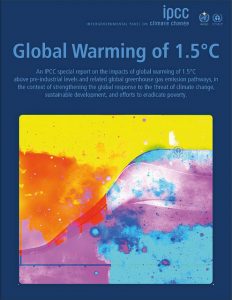Time is Running Out to Address Climate Change – IPCC

National pledges submitted to date through the agreement are not nearly enough to avoid more than 1.5°C of warming, the report noted. Greenhouse gas emissions from human activity, which come mainly from burning fossil fuels(ie coal and oil), would need to be cut roughly in half by 2030 and virtually eliminated by 2050 in order to keep from “overshooting” the 1.5°C target, said the report. That emissions instead increased by 1.4 percent in 2017 raises questions as to how serious governments are in carrying out the commitments made in the 2015 Paris Agreement.
The report is seen by many as a final warning, with only 12 years remaining to limit global warming to a maximum of 1.5C. Any rise beyond 1.5C will dramatically increase the risk of drought, extreme heat and floods with impacts on food production, large scale population displacement, further threaten the existence off a range of species and increase the chances of political instability and conflict
Debra Roberts, a co-chair of the IPCC working group, said: “It’s a line in the sand and what it says to our species is that this is the moment and we must act now. This is the largest clarion bell from the science community and I hope it mobilises people and dents the mood of complacency.”
According to David Boyd the UN Special Rapporteur on human rights and the environment “Climate change is having and will have devastating effects on a wide range of human rights including rights to life, health, food, housing, and water, as well as the right to a healthy environment”
“The world is already witnessing the impacts of climate change — from hurricanes in America, heat waves in Europe, droughts in Africa to floods in Asia.”
The IPCC is the UN body for assessing the science related to climate change. It was established by the United Nations Environment Programme (UN Environment) and the World Meteorological Organization (WMO) in 1988 to provide policymakers with regular scientific assessments concerning climate change, its implications and potential future risks, as well as to put forward adaptation and mitigation strategies. The current report was authored by 90 scientists after reviewing more than 6,000 scientific reports from a range of fields.



 8 October 2018
8 October 2018 







No comments yet... Be the first to leave a reply!